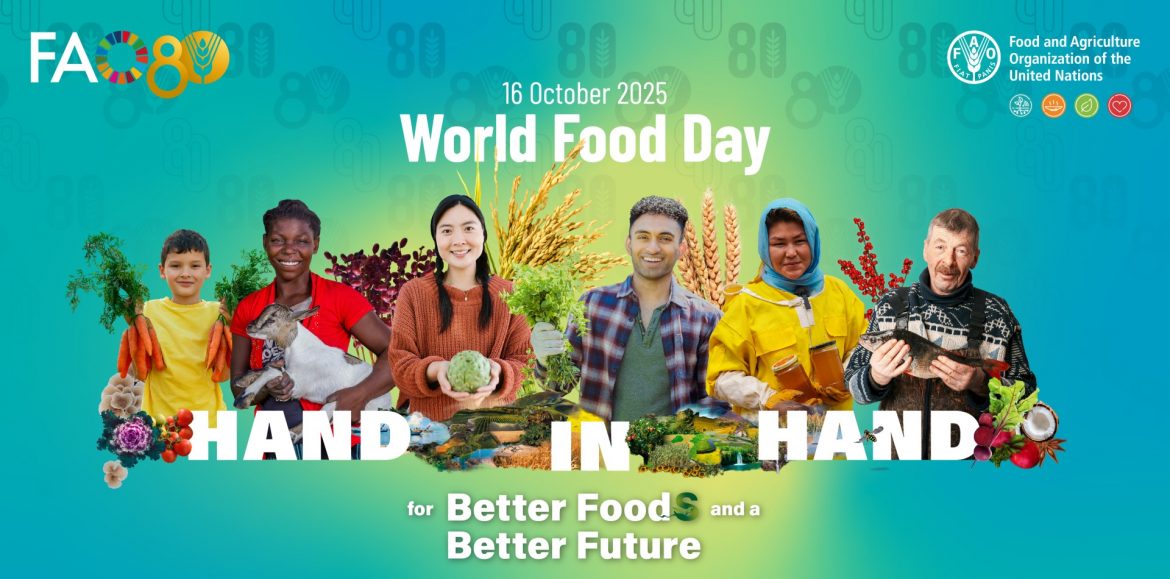This year’s World Food Day theme, ‘Hand in hand for better food and a better future!’, calls for global solidarity in building a more sustainable and equitable food system for all.
What makes this year’s celebration even more special is its 80th anniversary. Since 1979, the United Nations Food and Agriculture Organisation (FAO) has marked 16 October as World Food Day: a moment to promote global awareness and action for those who suffer from hunger, and to highlight the need to ensure healthy diets for everyone.
Why World Food Day matters
Although very important, food is more than nutrition; it’s about connection, culture, and sustainability. It’s what people the world over grow, cook, and eat together. It brings people together, no matter their backgrounds, culture or gender. It serves as nourishment, communication, art, and love. This World Food Day, take a moment to reflect on your own food habits and the small changes you can make to help nourish a better future for all.
1. Eat with intention
Food takes a lot of effort to grow, harvest, transport, and cook. One small habit you can consider following is mindful eating. When you’ve made, bought, or have been served a meal, take a seat, at least for one meal a day.
Mindful eating is about slowing down, appreciating where food comes from, and eating it without distraction (yes, no phones or binge watching your favourite series). We’ve all felt the pressures of fast lives: deadlines, instant gratification from social media, doom-scrolling, you name it. Our busy lifestyle often leads us to eat rushed meals or mindlessly binge on snacks while watching a show, forgetting to pause and eat with intention.
Eating mindfully makes you take longer when making decisions, whether in the store buying food, or at home dishing up a portion onto your plate. You’ll start making healthier choices for your body and the planet! This awareness can lead to a long list of benefits that may include improved digestion, better portion control, lower food waste, more satisfaction, less stress and angst, and greater gratitude and appreciation for local producers.
The more intentionally you eat, the more connected you’ll feel to your food, and to the people and planet that make it possible.
Read our mindful eating guide
2. Local is lekker
Why not make the change to buying local and seasonal produce this World Food Day? Consider shopping at your local farmer’s market, small grocer or local brand for fresh produce like vegetables, fruits and grains. Not only are you helping to financially support the future of local farmers, but you’re also lowering your carbon footprint. When buying imported produce and other products from big brands and grocery stores, we actually increase our grocery’s carbon footprint.
When we buy imported goods, our groceries’ carbon footprint increases dramatically. Commercial farming practices, land-use changes, transportation (especially importation), and certain food processing and packaging all contribute to greenhouse gas emissions, which in turn affect farmers worldwide through extreme weather and rising costs.
Next time you’re craving something special, skip the imports – your local grocer might surprise you (your taste buds and budget will thank you).
Also See: Is your weekly grocery shop adding to your carbon footprint?
3. Waste less, love more
South Africa is one of the leading countries in food waste, with over 10 million tonnes of edible food wasted each year. This affects people across all income levels. Food security and preventing food waste aren’t only about solving for hunger; they’re also about properly nourishing the community. As World Food Day highlights, the real challenge is not only about food production, but also about making nutritious food accessible, affordable, and culturally meaningful.
Tackling food waste starts in our kitchens. Here are a few small, impactful habits to start with:
- Plan meals and shop with a list to reduce waste.
- Prioritise local and seasonal fruits, vegetables, wholegrains, and legumes.
- Store food correctly, making sure to check expiry dates and rotating old stock.
- Use leftovers creatively, freeze surplus, or compost scraps.
- Teach children meal prep, budgeting, and healthy eating habits.
- Cook “root to stem” and “nose to tail”.
- Serve smaller, wiser portions.
Every peel, stalk, and leftover meal counts. Waste less, love more, and your kitchen will become a force for good.
Also See: Scrap gardening: 5 Supermarket foods you can regrow
4. Cook with community
Use food as your ancestors did: to nourish, to connect, and to pass down cultures and ways of doing. Share meals with your neighbours, cook together with your friends, host potlucks, or donate to food drives. Make food your voice. Use it to convey art, creativity, cultures, and people – and to advocate for what is right.
Also See: Bringing back sorghum
World Food Day might just be one day, but we can celebrate it in small ways throughout the year. Use this day to remind yourself that you have the opportunity to make everyday choices that nurture both people and the planet, as the saying goes, “When we change the way we eat, we change the way we live”.
Also See: How to keep your groceries fresher for longer
Feature image credit: un.org

